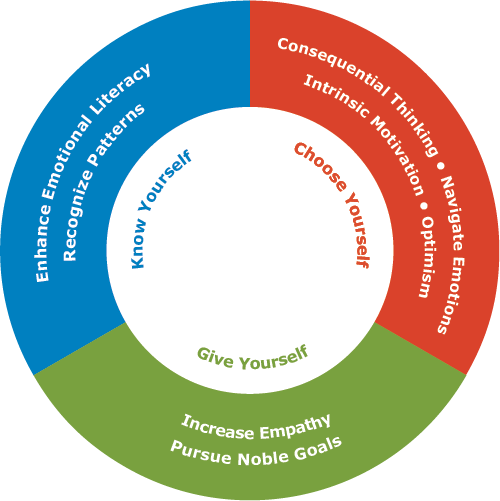How to Cope with Uncertainty:
Practicing Emotional Intelligence During Coronavirus
While we cannot control the pandemic and all that it brings, we can control who we are and what we want to stand for in the face of it.

The coronavirus has ground normal life to a screeching halt and replaced it with… questions.
So many questions. Most of which we can’t answer because we don’t have enough data. What are we left with? A whole lot of uncertainty. And uncertainty, as you’ve probably felt, can be a particularly difficult feeling. Our brains are hardwired to dislike it, to equate it with danger. Surprising fact about our brains: We’d rather know something bad is going to happen than be in a state of uncertainty.
The result? A spiral of reactivity.
Even people who usually navigate change well may find themselves reacting differently in times of deep uncertainty, starting to feel lost, hopeless, and anxious. When there is volatility & fear all around us, it reduces our own equilibrium. And that’s why in times like these, practicing emotional intelligence is more important than ever.
How to feel less out-of-control in the unknown
While we cannot control the pandemic and all that it brings, most of us actually do have a tremendous sphere of control. We CAN control who we are and what we want to stand for in the face of it. We can control what we read and what we share. We can control how we listen to and support the people around us.
To feel more in control, we have to remember the ways that we are in the driver’s seat. For example, we have choices about our thoughts, feelings and actions. We mightn’t have total control, but we have choice.
We also have choice about which feelings we focus on. Uncertainty can derail and paralyze us, but it can also fuel learning and growth and curiosity. When we’re pushed to change, we can resist, and, we can also break out of old patterns, establish new ones, and clarify what really matters. We can step forward with purpose, and take care of our and others’ emotional wellbeing during this challenging time.
Apply emotional intelligence to explore uncertainty
Each calendar quarter, Six Seconds chooses a theme as our focus for research and the free EQ Cafés our community holds around the world (online this quarter). Given the state of the world during this crisis, we’re focusing on a challenging, complex, and important feeling: Uncertainty.
Like most feelings, understanding the meaning of uncertainty will help us grapple with it. So this quarter we’ll dive into the neuroscience and psychology of the unknown. We’ll offer tips and strategies to navigate uncertainty with emotional intelligence. Here are a few resources to get started:
Go through the KCG process. Start with these essential questions, which form the basis of the Six Seconds Model of Emotional Intelligence: What am I feeling? What options do I have? What really matters?
Join the EQ Community. When you’re in deep uncertainty, it’s better together. Connect with the global community for emotional intelligence through the many free, low-cost, or in-depth emotional intelligence workshops. Plus, join us on social media.
Get certified as an EQ Practitioner. Emotional intelligence skills are learnable and form the foundation of a successful relationship with yourself and others. In challenging times, it’s more essential than ever. Join the global leaders in emotional intelligence for Unlocking EQ or the next step in your EQ journey.
The power of naming feelings
The first doorway to engaging our emotional intelligence is to turn in and recognize our own, and others’, feelings. No judgment, no action required: Just notice. So as you’re grappling with one of the world’s biggest challenges, if you’re feeling big emotions, recognize it. It’s a message from you, to you, and it’s trying to help you cope. Then consider: What else am I feeling?
What’s new in emotional intelligence?
Emotions As a Motivation Supercharger: 3 Essential Questions to Feel Motivated
What makes motivation… motivating? Three powerful questions, a free worksheet, and powerful ways to strengthen energy from within (which we all need, especially when work/life feels challenging)
The Power of Gratitude: How Focusing on the Good Changes Your Brain—and Your Life
Gratitude is more than a warm feeling. It’s a practice that changes how we relate to the world. How can you tap into the power of gratitude?
Overcoming Urgency: How Emotional Intelligence Helps You Slow Down and Focus on What Truly Matters
If you ever feel stuck in urgency mode, emotional intelligence offers a way out — and a way back to what matters most.
Integrated Emotions: Feelings Are Allies
What if all our feelings had value? Many people see emotions as “good” or “bad” — which leaves us in a constant state of internal struggle against our own feelings. Here’s a framework to rethink feelings as valuable signals about what’s important.
The Six Seconds Model of Emotional Intelligence: What It Is and How to Use It (+ PDF)
What is emotional intelligence and how do you practice it? Explore the Six Seconds Model of Emotional Intelligence to improve your life and relationships.
Plutchik’s Wheel of Emotions: Feelings Wheel
Grow your emotional literacy with Plutchik’s Wheel of Emotions. Then download the free Practicing Emotional Intelligence eBook to go deeper!
- Pursue Noble Goals in the Six Seconds Model of EQ - July 29, 2023
- Increase Empathy in the Six Seconds Model of EQ - July 26, 2023
- Exercise Optimism - July 24, 2023






I feel that is good to recognize our feelings as well as other people feelings.
Great video Josh “How are you feeling in the midst of Corona Virus Change”. I love how you always remind us that all feelings have value, and to remember that if one feeling has all our attention, we’ll most likely be unable to solve complex problems. Thank you.